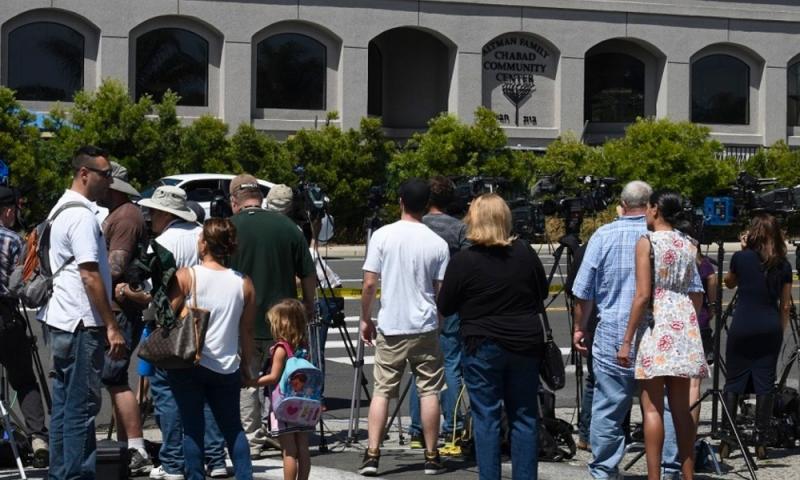One worshipper dead, three wounded in synagogue shooting
A gunman walked into a San Diego-area synagogue crowded with Sabbath worshipers on Saturday and opened fire with an assault-style rifle, killing one woman inside and wounding three others in a hate crime carried out on the last day of Passover, authorities said.
The suspect, a 19-year-old white male whose identity was not immediately made public, fled the scene by car and was arrested a short time later when he pulled over and surrendered to police, authorities said at a news conference.
The gun violence at the Congregation Chabad synagogue in the town of Poway, California, about 37km north of downtown San Diego, unfolded six months to the day after 11 worshippers were killed and six others were wounded by a gunman who stormed a synagogue in Pittsburgh yelling, "All Jews must die." The assailant in that incident was arrested.
Saturday's Passover violence followed a recent spate of deadly attacks on houses of worship around the world. Suicide bombings during Easter Sunday services at several churches in Sri Lanka killed more than 250 people. Weeks earlier a gunman who opened fire at two mosques in New Zealand left 49 people dead and more than 40 wounded, some as they knelt in prayer.
Poway mayor Steve Vaus, speaking from a police command centre, characterised Saturday's shooting as a "hate crime", saying his assessment was based on statements uttered by the gunman when he entered the synagogue.
Speaking with reporters at the White House, US President Donald Trump said, "My deepest sympathies go to the people that were affected." He added that "it looks like a hate crime" and that authorities will "get to the bottom of it".
San Diego county sheriff Bill Gore told reporters that four people were struck by gunfire and taken to Palomar Medical Centre, where one of the victims, an "older woman," died. The three other patients - "two adult males" and a "female juvenile" - were listed in stable condition, Gore said. The identities of the victims were not given.
Peaceful surrender
The attack occurred shortly before 11.30am in Poway, a suburb of about 50,000 residents, when the suspect walked into the synagogue and started shooting, Gore said. He was arrested a short time later when he peacefully surrendered to police.
A San Diego officer was en route to the shooting scene when he overheard a California Highway Patrol (CHP) radio dispatch "of a suspect who had called into CHP to report that he was just involved in this shooting and his location," San Diego police chief David Nisleit recounted.
"The officer was on the freeway and he saw the suspect in his vehicle. The suspect pulled over and jumped out of his car with his hands up and was immediately taken into custody," Nisleit said.
He said the assault-style rifle, believed to be the murder weapon, was found on the front passenger seat of the car.
Local television channel KGTV 10News said the synagogue was hosting a holiday celebration beginning at 11am and due to culminate in a final Passover meal at 7pm. Authorities said about 100 people were inside the temple, where Saturday services marking the Jewish Sabbath would have been under way or have just concluded.
San Diego television station KGTV reported a woman whose husband was still inside the synagogue as saying the rabbi was among those shot.
Minoo Anvari, an Iranian refugee who said her husband was attending services inside when gunshots rang out, told KUSI-TV the wounded included a female friend and the rabbi, who was shot in the hand. "We are united. You can't break us. We are in the US," Anvari told KUSI.
A man who lives nearby, Christopher Folts, said on CNN he heard six to seven gunshots, then a man yelling, followed by six to seven more shots.
Cantor Caitlin Bromberg of Ner Tamid Synagogue, down the street from the shooting scene, said her congregation learned of the shooting at the end of their Passover services and that they were heading to Chabad of Poway to show support and help.
"We are horrified and upset, and we want them to know we are thinking of them," Bromberg told The Los Angeles Times, adding that she has not heard from Chabad of Poway leadership because they would not normally use the phone during the Sabbath.
"They would only do that on emergency basis, if they do it at all," Bromberg told the newspaper.
- Reuters
RM12.50 / month
- Unlimited access to award-winning journalism
- Comment and share your opinions on all our articles
- Gift interesting stories to your friends
- Tax deductable

 Reuters
Reuters